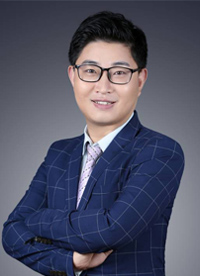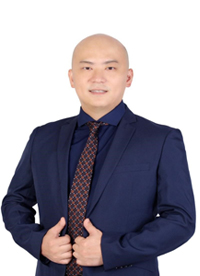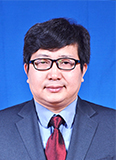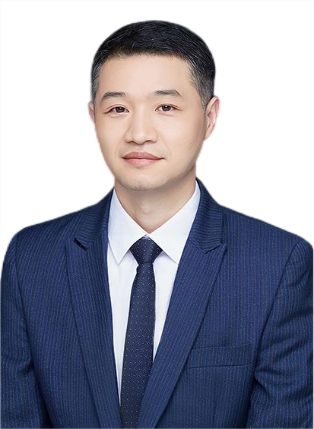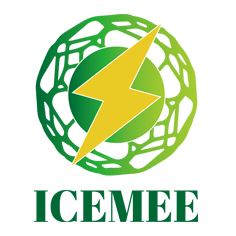
Speakers
| Prof. Hao Lu, Xinjiang University, ChinaProf. Santhanam Harikrishnan is an active researcher in the fields of phase change materials, nanofluids, and supercapacitors. He has published many papers in refereed journals, and in conference proceedings. He guided two Ph.D. scholars successfully in the fields of phase change materials and nanofluids. He is also one of the editorial team members in two Scopus indexed journals, and one in the SCI-E journal. He served as the panel session chair, reviewer, and Managing Guest Editor for four international conference proceedings. Dr. Hao Lu holds the distinguished positions of professor and doctoral supervisor and was handpicked for the prestigious National Overseas High-Level Talent Program by the Organization Department of the Central Committee of the CPC as a recipient of the esteemed Outstanding Young Scientist Fund in Xinjiang. Currently, Dr. Lu serves as the Vice Dean of the School of Intelligent Science and Technology (School of Future Technology) at Xinjiang University, where he plays a pivotal role as Deputy Director of the Ministry of Education Engineering Research Center for Carbon Neutrality in Northwest Energy, Head of the "Energy Carbon Neutrality" Innovation Team under the Double First-Class Initiative at Xinjiang University, and Director of the Technical Committee at the Guangdong Provincial Communication Lightning and Component Engineering Research Center. Dr. Lu's expertise is sought after nationally, as evidenced by his role as an expert reviewer for the National Science and Technology Expert Database, the National Natural Science Foundation of China, and the National Social Science Foundation of China, alongside being a member of the Academic Committee of the School of Electrical Engineering at Xinjiang University. His academic journey commenced with the acquisition of bachelor's and doctoral degrees in energy and power engineering from Wuhan University and Tsinghua University, respectively, in 2009 and 2014. From 2014 to 2018, Dr. Lu served as a postdoctoral research fellow at the Renewable Energy Research Center at the Hong Kong Polytechnic University and the Rolls-Royce Research Center at the University of Nottingham, UK. Subsequently, he held the position of a tenured Associate Professor at the South China University of Technology from 2019 to 2020, where he was selected for the esteemed "Xinghua Scholar" Talent Program. In 2021, he made a full-time commitment to Xinjiang University. Notably, in June 2023, he successfully completed the High-level Talent National Conditions Study Class at the Central Party School (National Academy of Governance) and delivered a compelling speech as a representative of the participants. Dr. Lu's research is deeply entrenched in the national carbon peak and carbon neutrality strategy, with a long-term commitment to various areas, including new energy generation and energy storage technologies, coal-fired power generation and carbon capture, utilization, and storage (CCUS) technologies, multiphase flow and heat and mass transfer in energy systems, integrated complementary energy systems, as well as key technologies and pathways for energy carbon neutrality and energy transition. He has published over 180 academic papers in domestic and international journals and conferences, including more than 90 SCI papers, with a cumulative SCI impact factor exceeding 500 and over 2000 citations. Additionally, he published over 30 EI-indexed papers, participated in the application and granting of more than 20 national invention patents, and contributed to the creation of two academic monographs. |
Prof. Yuanhao Wang, Shenzhen Polytechnic University, ChinaDr. Yuanhao Wang holds the distinguished position of a professor at the Hoffman Advanced Materials Research Institute, located within the prestigious Shenzhen Nobel Prize Laboratory at Shenzhen Polytechnic University. He is recognized as an expert enjoying special allowances from the State Council, selected as a scholar in the National Overseas High-level Talent Program (the twelfth batch of the Thousand Talents Plan), and honored with the "May Fourth Youth Medal" in Fujian Province. Furthermore, he spearheads a team in the "Peacock Plan" in Shenzhen. Dr. Wang hasdedicated himself tofundamental research and industrial transformation in the realms of micro-nano materials applied in green buildings, resource recycling and utilization, and new energy materials and devices. His scholarly contributions are substantial, with over 130 academic papers published in esteemed international journals such asAdv. Mater.,Adv. Funct. Mater.,Adv. Electron. Mater.,Nano Energy, andAppl. Catal. B, among others. Notably, he is the first author or corresponding author for 55 papers in JCR Q1, including 15 papers(IF ≥ 10), with a personal h-index standing at 34, and he actively serves as a reviewer for several international journals. Dr. Wang's leadership is evident in his stewardship of over 20 research projects funded by national and Guangdong-Hong Kong scientific research programs, amassing a total funding exceeding 50 million RMB. His innovative endeavors have led to the successful development of a series of groundbreaking products, including "Indoor environment disinfection and killing materials based on self-doped black titanium dioxide," "Transparent thermal insulation coatings for curtain walls," "Process for producing tailless fully tempered vacuum glass," "Stone protection agents suitable for wet board construction," "Self-cleaning coatings for photovoltaic modules," and "Flexible high-temperature resistant fireproof fabric." These innovations have garnered significant recognition, winning 5 gold awards at international invention exhibitions. Furthermore, Dr. Wang's prolific inventive spirit is reflected in the application and granting of over 40 patents, contributing to a total transformation benefit exceeding 80 million RMB. |
|
| Prof. Xiaogang Liu, Wuhan University of Technology, ChinaProf. Xiaogang Liu acquired his Ph.D. degree in Mechanical Engineering from the University of Queensland, Australia, and he is now a Professor and Doctoral Supervisor of Mechanical engineering and Instrument Science and Technology at the School of Mechanical and Electrical Engineering, Wuhan University of Technology. He has chaired two scientific research projects supported by the National Natural Science Foundation of China, and his academic outputs include academic papers, invention patents and software copyrights in the fields of Intelligent Manufacturing, Contact Mechanics, Mechanical Vibration and Electromechanical Control. As the leader of a provincial teaching and research project about mechanical manufacturing, he summarised these academic outputs into monographs to integrate research and education, and was recognised as Fellow of Higher Education Academy (FHEA). Currently, he is a senior member of the Chinese Mechanical Engineering Society, an expert of the high-tech industry in Wuhan, and was awarded the “T A Stewart-Dyer Prize/Frederick Harvey Trevithick Prize” by the Institution of Mechanical Engineers in London. |
Prof. Shubin Yan, Zhejiang University of Water Resources and Electric Power, ChinaShubin Yan received the Ph.D. degree from the State Key Laboratory of Quantum Optics and Quantum Optics Devices, Shanxi University, in 2006. He held a postdoctoral position with the Department of Precision Instrument, Tsinghua University, from 2007 to 2009. He is currently a Professor and the Deputy Dean of the School of Electrical Engineering, Zhejiang University of Water Resources and Electric Power. Meanwhile, he is also an Adjunct Professor with the School of Electrical and Control Engineering, North University of China. His research interests include functional unit of nanoscale optical waveguide, quantum optics device, microintegrated atomic clock, and the microsensor based on Ultrahigh-Q optical microcavity. He published 143 academic papers in important domestic and foreign journals such as Appl. Phys. Lett., Phys. Rev. A, Scientific Report, Opt. Express, Sensors, IEEE Photonics Technology Letters, Chin. Phys. B, IEEE Photonics Journal, etc., of which 33 were accepted in SCI, 54 in EI, and 56 in core journals; he has applied for 72 national invention patents, 38 of which have been authorized. |
|
| Researcher, Xiaolin Qin, Chengdu Institute of Computer Applications, Chinese Academy of SciencesDr. Qin Xiaolin, a researcher, is the Deputy Chief Engineer of the Chengdu Institute of Computer Applications at the Chinese Academy of Sciences (CAS) and a Member of the Institute’s Academic Degree Committee. Additionally, he serves as a professor and holds a Ph.D. Supervisor at the University of Chinese Academy of Sciences (UCAS). Recognized nationally and internationally for his contributions, Dr. Qin is a Senior Member of various prestigious organizations, including the China Computer Federation (CCF) and the Institute of Electrical and Electronics Engineers (IEEE). His accomplishments have been acknowledged with numerous accolades, such as being designated as an Academic and Technical Leader in Sichuan Province, recipient of the Provincial Outstanding Youth Fund, honoree of the “Tianfu Ten Thousand Talents Program,” and a Western Youth Scholar by the CAS. Dr. Qin holds several prestigious positions, including the Deputy Chairman of the Bio-Computing and Bio-Informatics Professional Committee of the Chinese Institute of Electronics (CIE), Secretary-General of the Sichuan Youth Association for Science and Technology (SYAST), and Deputy Secretary-General of the Sichuan Institute of Artificial Intelligence (SCIAI). His research expertise spans a broad range of topics within automated reasoning and algebraic vision, presiding in over a dozen major research projects funded by esteemed organizations like the National Natural Science Foundation of China (NSFC), the National Key Research and Development Program of China, the CAS Science & Technology Service Network Initiative (STS), and major AI science and technology projects in Sichuan Province. Dr. Qin has authored an impressive portfolio of over 80 academic papers published in prestigious domestic and international journals and conferences, several of which have garnered recognition on the ESI Highly Cited Papers list. He holds an extensive collection of over ten patents, authorized both nationally and internationally. His accomplishments have been widely recognized with numerous prestigious awards, including the First Prize at the provincial and ministerial level, the Second Prize for Scientific and Technological Progress in Sichuan Province, the Natural Science Award conferred by the CIE, the President Award (Excellent Prize) from CAS, and the Industry-University-Research Cooperation Innovation Award of China. Moreover, Dr. Qin assumes a pivotal role as the Deputy Leader of the “14th Five-Year Plan” and Medium- to Long-Term Science and Technology Development Plan for the Electronic Information Sector in Sichuan Province. Furthermore, he serves as an esteemed evaluation expert for the National Science and Technology Progress Award, as well as various science and technology awards and projects spanning over ten provinces and cities, encompassing esteemed institutions such as the Ministry of Science and Technology, Ministry of Education, Ministry of Industry and Information Technology, National Natural Science Foundation of China, and the Sichuan Provincial Government. |
